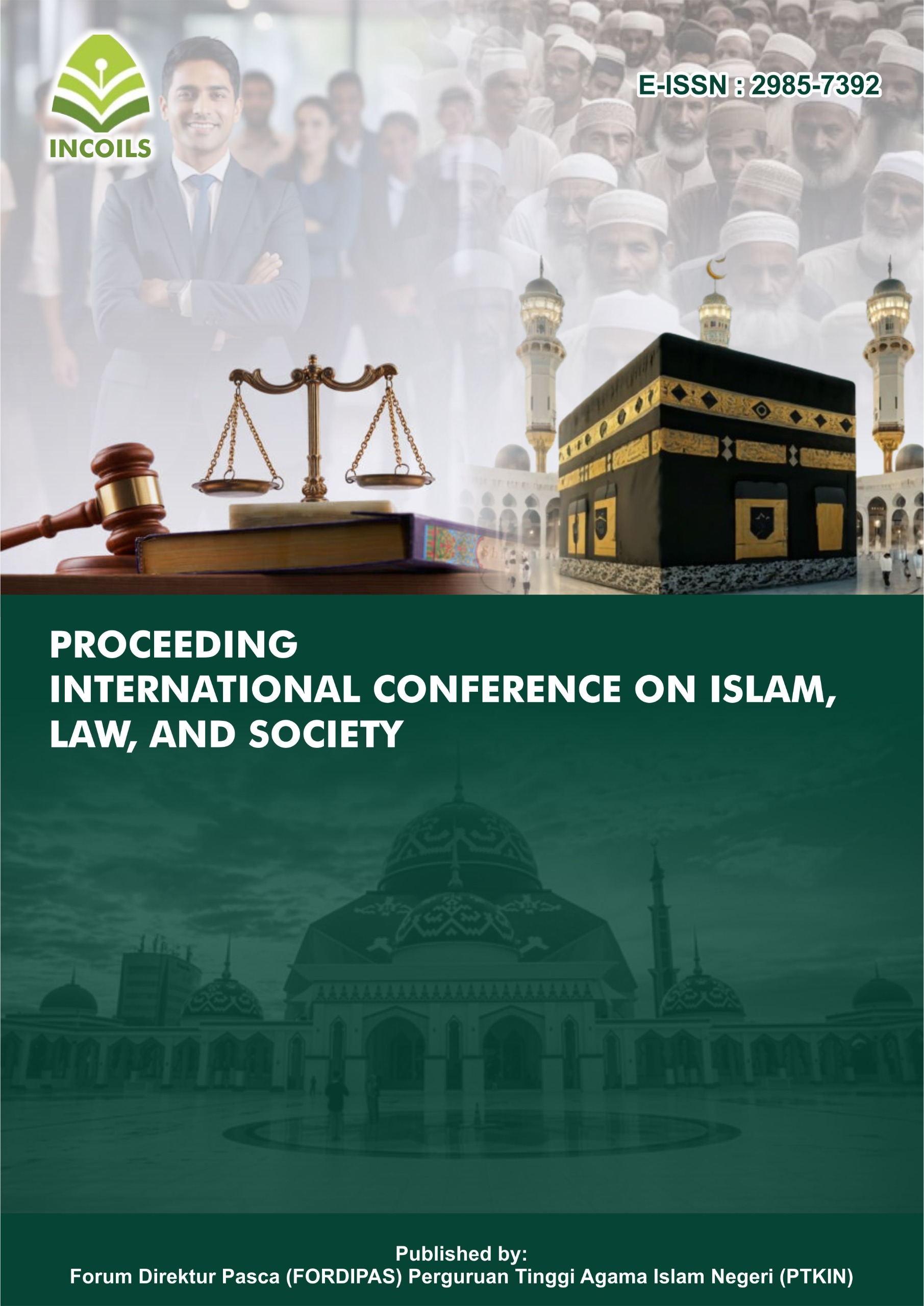Implementation of International Curriculum Development in the Independent Curriculum at Al-Muhafidzoh Blitar High School
DOI:
https://doi.org/10.70062/incoils.v3i1.191Keywords:
curriculum integration, development, Independent curriculum, international curriculumAbstract
The Merdeka Curriculum has become the main focus of education reform in Indonesia, aiming to give schools freedom to design curricula according to local needs. However, in the context of globalization, implementing an international curriculum is also important to prepare students to face increasingly complex global challenges. This research uses qualitative methods which aim to investigate the implementation process of International Curriculum Development within the Independent Curriculum Framework at Al-Muhafidzoh Blitar High School, with a focus on implementation methods and approaches, challenges and obstacles faced, as well as the impacts and benefits resulting from the implementation. Research methods include participant observation, in-depth interviews with key stakeholders, and analysis of related documents to gain a comprehensive understanding. The research results show that a collaborative approach between schools, teachers and other stakeholders is an important basis in facilitating successful implementation. However, there are challenges such as a lack of understanding of international standards, limited resources, and curriculum adaptation which are obstacles that need to be overcome. Nonetheless, the positive impacts of the implementation, such as improved student academic achievement and better preparation to face global challenges, demonstrate the importance of the effort. Overall, this research provides an in-depth understanding of the implementation process of International Curriculum Development within the Independent Curriculum Framework at SMA Al-Muhafidzoh Blitar. By identifying effective methods, overcoming challenges, and exploiting the resulting benefits, this implementation has great potential to improve the quality of education and better prepare students to face an increasingly global future.
References
Adegbola, Funmi. “Literacy Curriculum Development as Correlates to International Positive Schools and Well-Being in Nigeria.” Research and Advances in Education 2 (July 1, 2023): 1–5. doi:10.56397/RAE.2023.07.01.
Adilah, Nisa, Jay Galvez, Suliyanah Suliyanah, and Utama Alan Deta. “Analisis Implementasi Kurikulum Cambridge Pada Salah Satu Sekolah Internasional Di Jakarta.” Jurnal Ilmu Pendidikan Dan Pembelajaran 2, no. 1 (2023): 48–64.
Arifin, Zainal. “Implementasi Integrasi Kurikulum Cambridge Dengan Kurikulum Nasional Di SMP Islamic International School PSM Magetan.” Excelencia: Journal of Islamic Education & Management 4, no. 01 (2024): 1–11.
Aryati, Kadek. “The Impact of Merdeka Belajar Curriculum on English Language Teaching in International Institute of Business and Tourism.” EDUKASIA: Jurnal Pendidikan Dan Pembelajaran 4 (September 1, 2023): 1805–10. doi:10.62775/edukasia.v4i2.507.
Chotimah, Chusnul. “Penerapan Kurikulum Bertaraf Internasional Di MA Amanatul Ummah Pacet.” DINAMIKA: Jurnal Kajian Pendidikan Dan Keislaman 4, no. 2 (2019): 79–96.
Christiana, Rachel Anastasya, Achmad Supriyanto, and Juharyanto Juharyanto. “Implementasi Kurikulum Cambridge Di Sekolah Menengah Pertama.” Jurnal Pembelajaran, Bimbingan, Dan Pengelolaan Pendidikan 2, no. 4 (2022): 288–95.
Elfrida, Domina, Heru Santosa, and Totok Amin Soefijanto. “Pengaruh Kompetensi Guru Dan Implementasi Kurikulum Asing Terhadap Kinerja Guru Di Sekolah Internasional Jakarta Utara.” Tadbir: Jurnal Studi Manajemen Pendidikan 4, no. 1 (2020): 53.
Hanafiah, Hafidz, and Ardi Hidayat. “Pengelolaan Sumber Daya Manusia Pada Sekolah Dengan Kurikulum Internasional Studi Komparasi Di Sekolah Pelita Harapan, Sekolah Tunas Muda, Dan Sekolah Tzu Chi.” Jurnal Bina Bangsa Ekonomika 13, no. 1 (2020): 164–74.
Huda, Nurul. “Manajemen Pengembangan Kurikulum.” Al-Tanzim: Jurnal Manajemen Pendidikan Islam 1, no. 2 (2017): 52–75.
Irmita, Luthfia Ulva, Mia Hilda Amanda, Badrus Syamsi, and Anton Wardaya. “Implementasi Kurikulum Nasional, Internasional, Dan Peminatan (Olimpiade, Penelitian, Dan Profesional) Di SMA Wardaya.” Jurnal Eduscience (JES) 9, no. 2 (2022): 324–35.
Kamumu, Nardiansyah. “Implementasi Content and Language Integrated Learning (Clil) Dalam Pembelajaran Bahasa Lintas Kurikulum.” In Prosiding Seminar Nasional Pendidikan, 2:750–57, 2020.
Marvianasari, Reni, Agus Zaenul Fitri, and Abd Aziz. “Landasan Dan Paradigma Pengembangan Kurikulum Pendidikan Agama Islam (PAI).” Pendekar: Jurnal Pendidikan Berkarakter 2, no. 2 (2024): 69–80.
Pratama, Dian Arif Noor. “Tantangan Karakter Di Era Revolusi Industri 4.0 Dalam Membentuk Kepribadian Muslim.” Al-Tanzim: Jurnal Manajemen Pendidikan Islam 3, no. 1 (2019): 198–226.
Qutni, Darul. “Efektivitas Integrasi Kurikulum Dalam Pembentukan Karakter Peserta Didik (Studi Di Smp Daarul Qur’an Internasional Tangerang Internasional Pesantren Tahfizh Daarul Qur’an).” Jurnal Tahdzibi: Manajemen Pendidikan Islam 3, no. 2 (2021): 103–16.
Sahin, Ismail. “Detailed Review of Rogers’ Diffusion of Innovations Theory and Educational Technology-Related Studies Based on Rogers’ Theory.” Turkish Online Journal of Educational Technology-TOJET 5, no. 2 (2006): 14–23.
Setiawati, Fenty. “Dampak Kebijakan Perubahan Kurikulum Terhadap Pembelajaran Di Sekolah.” NIẒĀMULILMI: Jurnal Manajemen Pendidikan Islam 7, no. 1 (2022): 1–17.
Shobri, Muwafiqus, and Indah Ratul Amaliyah. “Implementasi Pengembangan Kurikulum Madrasah Bertaraf Internasional.” AKSI: Jurnal Manajemen Pendidikan Islam 1, no. 1 (2022): 1–15.
Sugiyono, Dr. “Metode Penelitian Pendidikan Pendekatan Kuantitatif, Kualitatif Dan R&D,” 2013.
Thalib, Mohamad Anwar. “Pelatihan Teknik Pengumpulan Data Dalam Metode Kualitatif Untuk Riset Akuntansi Budaya.” Seandanan: Jurnal Pengabdian Pada Masyarakat 2, no. 1 (2022): 44–50.
Tiniyyah, Antiq Kusthon, Agus Zaenul Fitri, and Abd Aziz. “Evaluasi Kurikulum 2013 Menggunakan Model Campuran Multivariasi Di Era Society 5.0: Studi Kasus Di MAN 2 Kota Kediri.” Dirasat: Jurnal Manajemen Dan Pendidikan Islam 9, no. 2 (2023): 137–50.
Wulandari, Risfita, Muhammad Shohib, and Azam Othman. “The Implementation of the International Baccalaureate Curriculum of the Industry Era 4.0.” JIE (Journal of Islamic Education) 9 (January 17, 2024): 141–67. doi:10.52615/jie.v9i1.342.
Wulandari, Widya. “INTEGRASI KURIKULUM CAMBRIDGE DENGAN KURIKULUM MERDEKA DALAM PEMBENTUKAN KARAKTER KELAS X DI SMAN SUMATERA SELATAN.” UIN SUNAN KALIJAGA YOGYAKARTA, 2023.
Yi-Chia, Lin. AN ANALYSIS OF THE NEW CURRICULUM OF TAIWAN’S HIGH SCHOOLS INTEGRATED WITH THE INTERNATIONAL EDUCATION CURRICULUM, 2022. doi:10.24507/icicelb.13.01.57.
Yulianti, Marsela, Divana Leli Anggraini, Siti Nurfaizah, and Anjani Putri Belawati Pandiangan. “Peran Guru Dalam Mengembangan Kurikulum Merdeka.” Jurnal Ilmu Pendidikan Dan Sosial 1, no. 3 (2022): 290–98. http://www.putrapublisher.org/ojs/index.php/jipsi/article/view/53.
Downloads
Published
How to Cite
Issue
Section
License

This work is licensed under a Creative Commons Attribution-ShareAlike 4.0 International License.







